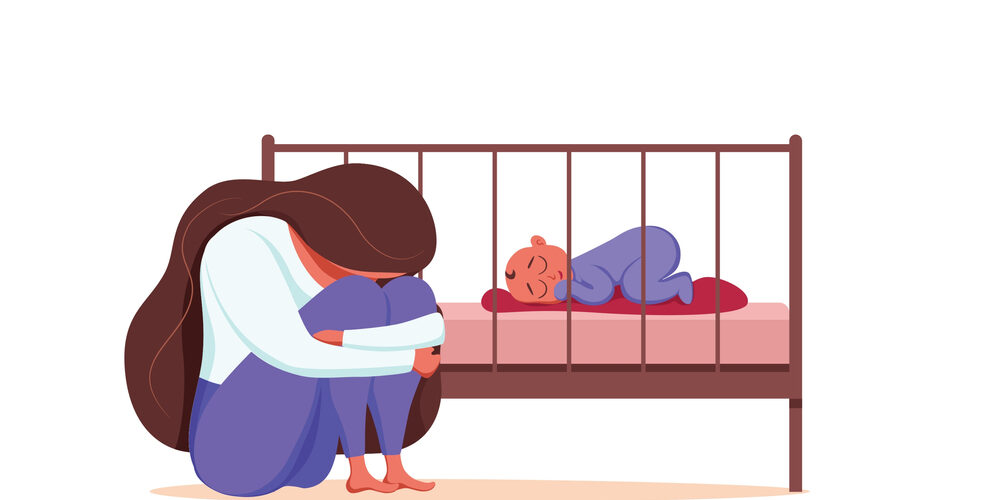A baby introduces the family, especially the mother, to many new emotions. Some of these emotions are normal and as expected. Others, however, may be strong and challenging. This time can be especially difficult for those mothers who either have a history of psychological disorders or who have a close family member battling a mental disorder. The chances of such new mothers developing post-partum psychosis (PPP) increases significantly.
The symptoms of post-partum psychosis may start appearing as early as one month after the birth of the baby or may appear for up to two years after the birth of the baby. If these symptoms continue for more than two weeks, then you must seek professional help. In the meantime, here are 15 tips that can help you deal with post-partum psychosis and plan for it in advance.
- Tell at least one other person how you feel: Many women experience mood and anxiety issues during pregnancy. Some of these issues include intrusive thoughts, trouble sleeping, or weeping spells. Speaking with someone you trust can help make sense of things and be a tremendous relief at the same time.
- Ask your spouse, family and friends for help: Assistance from friends and family will be crucial to your recuperation. Do not shy away from asking them for help and when they do offer, accept it. Inform them of your preferred method of support. This gives them a better idea of how to support; it gives you time for yourself and reduces the burden of taking care of the baby.
- Spend time with your loved ones: Try to spend some time with people who make you feel good. Your “feel good” brain chemicals are increased when you spend time with the people you love, improving your mental health.
- Get enough rest: Although getting a good night’s sleep can improve your attitude and energy levels, it can be challenging when you have a newborn. Involve your family and friends to take care of the baby so that you can get adequate rest. This is imperative for sound mental health.
- Make eating a top priority: What you eat impacts your mood. Maintain steady blood sugar levels and make sure you get adequate vitamins and nutrients. Experts believe that a good gut health is directly connected to good mental health.
- Get outside regularly to get some fresh air: Ensure that you step out of the house regularly for a small walk or to meet a friend in the park. The fresh air will give you better perspective and you will enjoy some downtime, which will be good for your mental health.
- Resume exercise slowly to help recover from depression: Start indulging in short-term exercises or walks with gradual jogs. Exercising releases endorphins, the feel-good hormones. Regular release of these hormones ensures good physical and mental health.
- Join a mother’s group: Joining a mother’s support group provides comfort in knowing that other mothers also experience similar struggles. Knowing that you are not alone is a great mental health booster.
- Start taking fish oil tablets: Experts believe that fish oil is effective in maintaining good mental health. Although its effectiveness for treating depression is unknown, it can certainly help with symptoms. Omega-3 supplements outperformed placebos in a recent meta-analysis of ten randomized controlled trials involving more than 910 participants with depression. The effects were more pronounced in the initial phases of depression.
- Bond with your baby or infant: The strong attachment that develops between mothers and babies is known as emotional bonding. An effective bonding process enables the child to feel secure enough to develop normally. This bond also encourages the mother to look forward to the journey of motherhood with great expectations. This inspires the mother to take care of her mental health.
- Be aware that PPP is not just an emotion or feelings: Post-partum psychosis is not just a feeling; it is much more than that. It is a mental health disorder. However, timely professional guidance can help manage and treat post-partum psychosis.
- Be regular with your medicines, therapy and counselling sessions: Ensure that you are regular in taking your medicines and filling your prescriptions. Attending therapy and counselling sessions is also important to confirm healthy and timely recovery.
- Be optimistic and hopeful: Always remember that illnesses and disorders can be treated with proper professional intervention. Being hopeful and optimistic is half the battle won. Harboring positive thoughts encourages a sound mental health.
- Create a support strategy: Think about and write down your support strategy. Discuss this strategy with your friends and families so that they know what to do and how to do in case you start experiencing symptoms.
- Make time for yourself: Take time out for yourself and do something that you enjoy. This does not mean that you are making yourself unavailable for your child. It only means that you need to do something that would make you feel good.
The way forward
If someone you know is experiencing any symptoms related to post-partum psychosis, then seek medical help immediately. Athena Behavioral Health offers residential treatment programs for people suffering from psychosis or any other mental health condition. Our experienced staff can customize the treatment plan for post-partum psychosis and offer 24/7 care to the patients. For more information and treatment programs for post-partum psychosis, WhatsApp us at 9289086193. Our admission counsellor is available to guide you with your queries.






